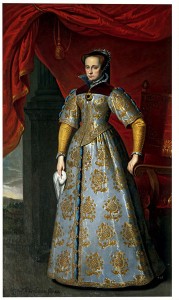
Mary had heard the news of her half-brother’s death from goldsmith Robert Reyns on 7th July, while she was staying with Lady Burgh at Euston Hall, near Thetford.
On 8th July 1553, Mary travelled home to Kenninghall, her estate in Norfolk, where her physician, Thomas Hughes, confirmed that news of the King’s death was true. Mary gathered together her loyal household and informed them of Edward VI’s death, going on to tell them that “the right to the crown of England of England had therefore descended to her by divine and by human law”. Mary’s household reacted by cheering and then they “proclaimed their dearest princess Mary as queen of England.”
On 9th July 1553, Mary wrote to the Privy Council stating her claim to the throne and demanding their allegiance. However, Edward VI’s ‘devise for the succession’ had named Lady Jane Grey as his successor.
Also on this day in history…
- 1503 – Margaret Tudor said farewell to her father, Henry VII, and set off to Edinburgh to marry James IV. Anne Boleyn’s father, Thomas Boleyn, was one of the men who accompanied her. Click here to read more about this.
- 1549 – The beginning of Kett’s Rebellion in Norfolk. Click here to read more about this.
Notes and Sources
- Mary Tudor: The First Queen, Linda Porter, p195-196.
- Actes and Monuments, Book X, John Foxe – see John Foxe link